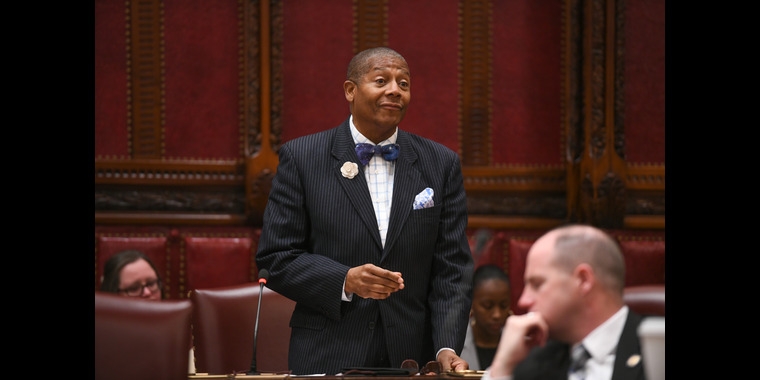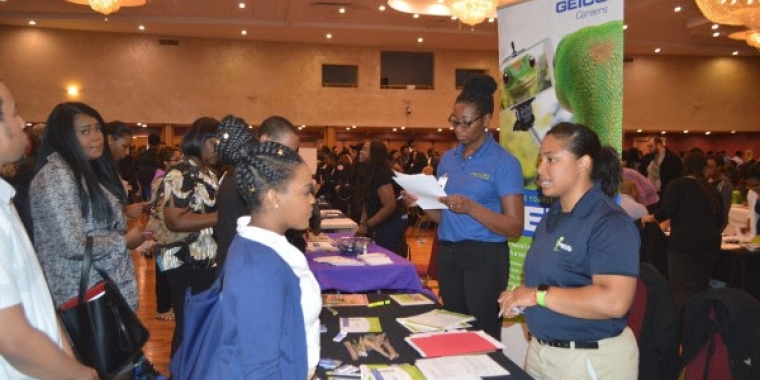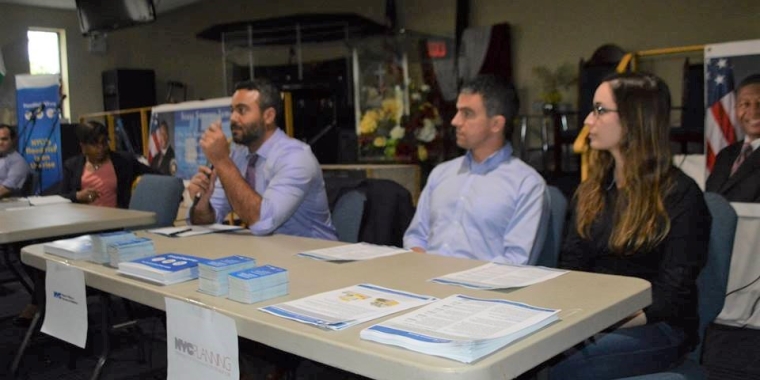
Senator James Sanders Jr. and the New York State Senate Majority Passes SFY 2024-25 Budget Addressing Critical Priorities for New Yorkers
James Sanders Jr.
April 21, 2024
-
ISSUE:
- 2024-2025 Budget

(Albany, NY) — The New York State Budget for FY 2024-25 was enacted today addressing the pressing needs of working individuals and families, safeguarding public education, and implementing affordable housing reform. The New York State Enacted Budget for Fiscal Year 2024-25 totals $237 billion, an $8 billion increase over last year. The budget thoughtfully tackles many issues including housing, education, health, public safety, shuttering unlicensed cannabis storefronts, and many other pressing issues. The budget does not raise income or statewide business taxes.
Senator James Sanders said, "While I commend the efforts made in the FY 2024-25 budget to address critical needs such as clean water infrastructure, climate priorities, and investments in parks and recreation, we must recognize that these actions, though significant, are only a fraction of what is needed to truly safeguard our environment and ensure equitable outcomes for all New Yorkers. As we celebrate progress, let us remain steadfast in our commitment to advocating for comprehensive measures that address systemic injustices and provide meaningful reparations for marginalized communities, especially in the face of pressing environmental challenges.
The Enacted Budget includes the following:
GOOD
Restoration of Public Education Funding
Carrying on the proud legacy of being the “education conference,” the Senate Democratic Majority ensured that no cuts would be made to school funding, and that kids across the state would still receive the investments that they both need and deserve. Thanks to the Democratic Conference’s advocacy, this year’s budget will also include transformative investments in higher education to make continued learning more accessible These wins include:
School Funding
- Rejecting the Executive’s proposal to eliminate Hold Harmless and also increasing Foundation Aid for the poorest 63 districts in the State. This is a Foundation Aid increase of $934 million, or 3.9 percent, over the current school year, which is an increase of $430 million, or 1.8 percent, over the Executive’s Foundation Aid proposal.
- Comprehensive Study by The Rockefeller Institute and NYS Department of Education to develop a modernized school funding formula.
- $180 million to continue our historic commitment to providing universal school meals for thousands of New York children.
- An additional $100 million for Universal Pre-K to allow school districts throughout the state to serve at least 90% of eligible four year olds.
Higher Education - Supporting SUNY/CUNY
- The Enacted Budget increases SUNY Operating Aid by $60 million, Capital by $60 million and Community College Support by $6 million over the Executive’s proposal.
- Increases CUNY Operating Aid by $40 million, Capital by $40 million and Community College Support by $4 million over the Executive’s proposal.
- The Enacted Budget increases the Tuition Assistance Program–for the first time since 2000–by $53 million to make college more affordable. It increases the minimum award from $500 to $1,000 and adds part-time tap for proprietary students. This increase also includes raising the TAP income threshold, by:
- Increasing the household income limit for dependent students from $80,000 to $125,000
- Increase the married, no children income ceiling from $40,000 to $60,000 (Net Taxable Income)
- Increasing the max income limit from $10,000 to $30,000
Revitalizing Housing for All New Yorkers
Amidst the ongoing housing crisis in New York, the Enacted Budget targets both the affordability and supply of the current market. The Budget includes:
- Housing Opportunities for the Future - a new $150 million program to build affordable homes and rentals across New York State.
- A new opt-in construction or commercial conversion tax exemption for affordable housing outside the City of New York.
- Establishes the crime of Deed Theft, to protect homeowners from having someone steal the title to their home through fraudulent or deceptive practices, often which are targeted towards elderly homeowners. This provision would allow for the prosecution of individuals who intentionally alter, falsify, forge, or misrepresent property documents unlawfully transfer ownership rights of real property.
- $140 million in capital funding for NYCHA.
- $80 million to support Mitchell-Lamas and $75 million to support public housing authorities outside of New York City.
- $40 million in the Homeowner Protection Program (HOPP)
- A total of $10 million in Eviction Protection Funding in New York City and $40 million for outside New York City.
- Needed New York City Specific Housing Advances:
- Extension of the 421a construction completion deadline until 2031 to ensure that vested projects that had started construction prior to the expiration of 421a are able to continue.
- It also implements 485x, a new version of 421a, to build new multifamily buildings across New York City with stronger labor and wage standards and requires levels of affordability. It also lifts the Floor Area Ratio (FAR) cap to allow for higher density buildings.
Supporting Working Families and Making Daily Life More Affordable
- A historic $350 million for a new supplemental tax credit for families eligible for the Empire State Child Tax Credit to provide direct support to working families and continues to implement the lowest Middle-Class Tax rate in over 70 years, saving average New Yorkers millions of dollars.
- Allowing children ages 0-6 to remain continuously enrolled in Medicaid or Child Health Plus without having to redetermine eligibility, to ensure children have stable and affordable health insurance for their first years.
- Advances $50 million for customers enrolled in the NYSERDA EmPower+ Program to electrify their homes, providing subsidies to guarantee customers don’t spend more than 6% of their income on an electric bill.
- Provides Tier 6 reform by changing the final average salary calculation window for Tier 6 members from five to three years to help incentivize workforce retention.
- Includes a 2.84% COLA for Human Services includes a 1.7% target salary increase for specific support, direct care, clinical, and non-executive administrative staff. This represents a notable increase over the Executive’s 1.5% COLA proposal.
Access to Affordable Childcare:
- The Enacted Budget includes $1.78 billion for the New York State Child Care Block Grant, an increase of $754.4 million, which will provide subsidies for 119,000 eligible children.
- Includes $280 million in underutilized federal pandemic funds to continue the Workforce Retention Grant program and provide another round of bonus payments to employees at 14,000 programs statewide.
- The Enacted Budget will also continue $6.25 million for the Child Care Facilitated Enrollment program in New York City and $5.6 million to the rest of the state. This program is designed to help qualifying working parents get access to childcare in New York City.
Spurring Economic Growth and Supporting New York Small Businesses
- Empire AI, a pioneering consortium to develop and inaugurate a cutting-edge artificial intelligence computing center in Buffalo, with statewide partners to ensure New York’s leadership in the burgeoning AI space.
- Includes the "Newspaper and Broadcast Media Jobs Program." This will secure several key measures to support and promote local media:
- It will create a personal income and corporate franchise tax credit for certain qualifying, independently owned print media or broadcasting entities, including those that have experienced workforce or circulation decline in the last five years.
- It places a total cap on the credit per entity of $300,000, and an annual cap of $30 million. It sets aside $4 million to provide a $5,000 credit for the hiring of new employees, and $26 million set aside for the retention of current staff. Half of the funds will be set aside specifically for those with 100 or fewer employees.
- This budget adds $365,000 over the Executive proposal in additional funding for the Minority and Women-Owned Business Development lending program, for a total of $1 million.
- It also increases the grant amounts for Entrepreneurial Assistance Centers from $175,000 to $250,000 to support small businesses and MWBEs across the state and help establish EACs in unserved areas.
Enacts the Retail Security Tax Credit, which helps small businesses make the
Cannabis
- Language to lower the medical cannabis tax rate from 7% to 3.15% and direct revenue to counties in order to keep them whole.
- Increased enforcement powers for the Office of Cannabis Management (OCM) to enable cities and counties to crack down on illegal cannabis shops.
Access to Quality and Affordable Healthcare
- $7.5 billion invested in New York’s health care system through modifications to the state's 1115 Medicaid Waiver to be used for promoting health equity, diminishing health disparities, and enhancing access to primary and behavioral health care.
- $800 million in support for distressed and safety-net hospitals.
- Continuing to increase the minimum wage for home care workers.
- Establishing minimum collection policies for medical debt, increasing eligibility for hospital financial assistance, a uniform financial assistance application for all hospitals, prohibiting hospitals from using immigration status as a criterion for financial assistance eligibility, requiring reporting on users of financial assistance, and clarifying that the notice requirements on medical credit cards apply to hospitals as well as other health care providers.
- Eliminating cost-sharing for insulin in commercial insurance for thousands of New Yorkers.
- Requiring commercial insurance to reimburse outpatient behavioral and substance use disorder treatment services at no less than the Medicaid rate.
Mental Health
- Providing $55 million to establish 200 new inpatient psychiatric beds at State-run facilities.
- Investing $33 million to enhance mental health services targeting first responders and aiding individuals with mental illnesses involved in the criminal justice system.
- Allocating $19 million for mental health services for school-aged children.
- $75.8 million increase for Crisis Services, which includes improving public safety by addressing serious mental illness and providing critical care to young people.
- $8 million increase to the Judiciary to support Mental Health Court operations.
- Extending the Mental Health Support and Workforce Reinvestment Program for an additional three years, allowing Office of Mental Health to reinvest savings from the closure of State-operated inpatient facilities for workforce development activities and community mental health services
Supporting Reproductive and Maternal Health
- Passing First in the Nation Paid Prenatal Leave, providing 20 hours of paid sick time for pregnant employees to use for their prenatal care visits.
- Codifying the Reproductive Freedom and Equity Grant Program to provide funding for abortion providers and non-profit entities to support increased access to abortion.
- Enacting the Community Doula Expansion Grant Program to provide funding to community-based organizations for recruitment and retention and startup and administrative costs to increase the number of community doulas.
- Allowing the Health Commissioner to issue a statewide, non-patient specific order to provide doula services for any pregnant, birthing, or postpartum individual.
- Requiring Paid Breaks for Breast Milk Expression in the Workplace for 30 minutes.
Fostering Children’s Wellbeing and Advancing Youth Development
- $103.2 million for After School Programs, an increase of over $20 million from last year’s budget.
- $10 million for the Youth Sports Initiative.
- $1.5 million in additional funding for the Youth Development Program, for a total of $15.6 million.
- $1 million in additional funding for the Runaway and Homeless Youth Act program, for a total of $8.1 million.
- $2 million in additional funding for Child Advocacy Centers, for a total of $7.2 million.
Commitment to New York’s Environmental and Climate Goals
- Adding $250 million over the Executive proposal for the Clean Water Infrastructure Act for a total of $500 million.
- Successfully reversing cuts to the Environmental Protection Fund for an investment of $400 million to support climate priorities across New York State.
- Expediting the siting and construction of electrical transmission and commercial energy storage through the RAPID Act, with the addition of Senate Majority proposals to preserve prime agricultural land, incorporate greater community input in the siting process, and improve labor standards.
- $1 billion for the Office of Parks, Recreation and Historic Preservation and investing $47 million to plant 25 million trees by 2033.
- $300 million in Capital for enhancing and improving parks statewide and $150 million for the New York Statewide Investment in More Swimming (NYSWIMS) program to improve pools and build new ones in communities across the State.
Investing in Local Communities by Funding Local Government and Critical Infrastructure
- The Senate’s successful inclusion of Sammy’s Law, which will authorize citywide speed limits to be reduced at DOT’s discretion, upon authorization from the New York City Council, allowing for the speed limits to be changed from 25 mph to 20 mph, and to lower special traffic-calming zones from 15 mph to 10 mph.
- $2.5 million added by the Senate Democrats to establish and support the Dr. John L. Flateau Voting Rights and Elections Database of New York to assist in efforts to enforce the John R. Lewis Voting Rights Act of New York, increasing both accountability and transparency in New York’s elections system, and $5 million in assistance for Local Boards of Elections.
Increased Funding for Public Transportation Across New York State:
- $4.2 billion for the MTA, an increase of $140 million or 3.4 percent from SFY 2023-24.
- $551 million for non-MTA downstate systems, a 5.4 percent increase in funding.
Investing in Public Safety and Combating Hate Crimes
- Preventing hate crimes:
- Expanding the range of offenses that can be prosecuted as hate crimes.
- Investing an additional $35 million in the Securing Communities Against Hate Grant to safeguard houses of worship, religious schools, and other vulnerable locations.
- Enhancing public safety with strategic community investments:
- Allocating $347 million to continue efforts to reduce and prevent gun violence in New York.
- Providing $35.7 million to combat and prosecute domestic violence crimes.
- Reducing recidivism and improving workforce reentry:
- Investing $7.1 million to provide more intensive supervision for individuals on parole through the Supervision Against Violent Engagement (SAVE) program
- Expanding transitional housing and college programming across all state prisons.
- $1 million for transportation for visitors to and from State Correctional Facilities.
- Strengthening street safety through new initiatives:
- Implementing measures to combat toll evasion on roads and fare evasion on subways, commuter rails, and buses, including cracking down on vanish plates and fraudulent paper plates.
- Combatting Retail Theft Crimes:
- Creates a Class E felony for assaulting a retail worker.
- Allowing for aggregation of retail theft crimes to make it easier to prosecute repeat offenders.
- Fighting to Prevent the Aggravated Harassment of Transit Workers:
- This budget creates a new Class A misdemeanor, Aggravated Harassment in the Second Degree, which would make it a crime for an individual to intentionally subject a transit worker to unlawful physical contact. (Taken from a bill introduced by Senator James Sanders Jr - S.5917).
- Combatting AI Deep Fakes:
- Protecting against Sexually explicit Artificial Intelligence- expands the existing statutory right to privacy, which says that it is unlawful to use a person’s name, portrait, or picture for commercial advertising without consent, by adding “likeness and voice” to the list of protected characteristics.
- Combatting the use of Deep fakes in Elections- the legislation requires distributors or publishers of “materially deceptive” political communications to disclose the use of digitization. It also gives candidates a private right of action to seek injunctive relief and court and attorneys’ fees.
- Continuing Funding into AAPI Equity: The Senate fought to include $30 million for AAPI Equity Coalition priorities for crisis intervention initiatives and community-based programs to combat bias crimes.
Reparations Commission
- Provides $5 million for the New York State Community Commission on Reparations Remedies.
BAD
- The Adopted Budget does not include funding for an Environmental Impact Statement for a proposed “QueensLink,” which would be the first north-south subway in Queens. This project would dramatically improve mass transit accessibility in Southeast Queens and reduce greenhouse gases.
- The Adopted Budget fails to include requiring a study for a state public bank and the option for municipalities to create public banks.
- Does not provide for the reciprocal acceptance of minority and women-owned business enterprise ("MWBE") certification between an MWBE program operated by New York City and the New York State MWBE program operated by NYS Empire State Development.
- It did not include repealing the rebate on the Stock Transfer Tax that the State would collect nearly $13 billion per year primarily from the wealthiest stock speculators who live outside New York State.
NEEDS MORE WORK
- Funding for the New York State Division of Minority and Women's Business Development needs to significantly increase to at least $5 million.
- The NY Heat Act needs more work.
###
Share this Article or Press Release
Newsroom
Go to NewsroomWilliam McDonald
May 15, 2017



